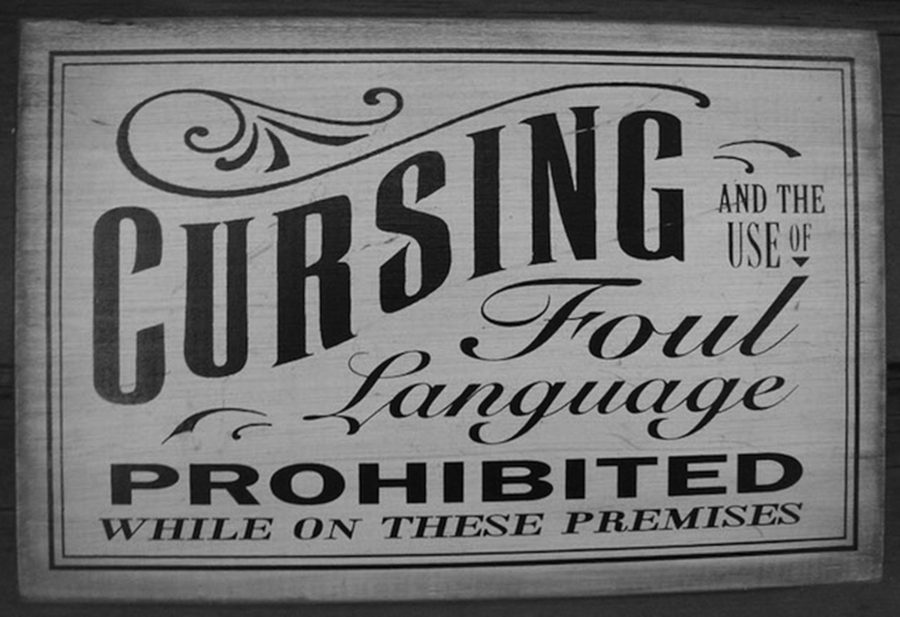Yes- Dennis Child, Opinion Editor
From a young age, we are all taught that using curse words is a negative behavior and will not be tolerated. Dirty language is thought to lead to aggression and disrespectful tendencies. But, usage of curse words may cause more benefits than harm.
Swearing can give one a sense of power and control over a bad situation. Using curse words shows that one is not just a victim and has control and is willing to fight back. This can lead to a boost in one’s self confidence and provide a starting point for further action to be taken to correct an issue. “Swear words, in some situations, are more forceful and dominant than not using them. They can be used to help get your point across in an argument,” senior Jeffrey Grant said.
Also, the use of swear words can be used as a nonviolent alternative to physical actions such as fighting. When a situation occurs in which one has the urge to hit someone, using curse words can help get their anger out safely. Yes, swear words can hurt other people emotionally, but this is much better than causing physical injuries to others. It can serve as a warning to others to stay back and leave you alone or you are not afraid to take further action. “You can use curse words to express rage, anger and frustration, rather than through physical violence,” senior Alex Arner said.
Swearing can also be used to improve one’s psychological and physical health. It can be used in moderation as a healthier way to reduce one’s stress. When curse words are used, they can make one feel better about the situation that they are in. According to Psychology Today, “the health benefits of swearing include increased circulation, elevated endorphins, and an overall sense of calm, control, and well-being. The key is to do it sparingly and not to get angry at the same time, which would be very bad for you — as well as terribly vulgar.”
People may argue that there are viable options of words that can be used in place of curse words. But words such as “fudge” or “darn” do not relieve the anger that is felt as successfully as bad words do. “Curse words are usually uttered with fury or frustration — the whole body is involved,” according to Laura MacLeod, licensed social worker. “When we complain, vent or share anger without cursing, we are keeping ourselves in check.”
Cursing also can be helpful in allowing people to express their true feelings on a certain topic. Swearing is a great way to show that one really means something or it is really important to them.
Of course, excessive cursing can be a bad thing, so as long as curse words are used in moderation, they can be beneficial. “I use swear words occasionally when I feel strongly about my opinion on a certain topic and wish to be more assertive,” junior Kevin Scher said.
No- Grant Saylor, Staff Writer
Cursing is one of the most effective ways to get your emotions heard. But to what point is cursing excessive and unnecessary?
There is only one reason that people should curse. It is somewhat necessary to curse when you are inflicted with pain because cursing helps relieve the pain that pain quickly. For example, if you stub your toe, shouting out a quick curse word could help relieve that pain.
With this one positive to cursing, there are countless negatives. For example, cursing can be seen as a threat “If someone was cursing at me I would immediately assume they are threatening me.
It depends on the circumstance but in most situations I would take it as a threat.” senior Justin Yao said.
Threats can be taken seriously not only in person but also through social media. “I think if you were to curse on a Facebook post for example, people might not understand the true context and could take it the wrong way which can create issues and start drama,” junior Omar Sadiq said.
Another negative to cursing is that it can show a lack of intelligence more so a lack of understanding vocabulary . Cursing typically occurs if a person substitutes a curse word for something they cannot explain otherwise. “I’m definitely trying to remove cursing from my common conversations because it just sounds bad. I feel like people curse sometimes when they don’t know what to say, and that looks really bad,” senior Armen Chubukian said.
Cursing can also tell a lot about someone’s mannerisms. If you are at a dinner table with your boyfriend or girlfriend’s parents, cursing is probably something you want to leave out of the conversation. “I think that curse words are bad in a sense that they are disrespectful, if you are at a friend’s house and their parents hear you cursing, they will have a quick judgement of you and most likely it will not be good,” senior Trent Folk said.
Cursing when first meeting someone can leave a bad first impression that could be hard to overturn. “If I had a teacher that used curse words, I would automatically think that they are not the brightest and probably make an attempt to switch out of the class,” junior Jack Berman said.
Another reason cursing is bad is that it can be offensive. Since the English language adapts frequently, you never know what words can offend others. “The word retarded has become a lot more offensive, so it’s hard to tell if you are being offensive, it’s difficult to draw the line of going to far now and that’s because our slang keeps changing,” junior Nick Baldwin said.
When it comes to cursing, sometimes it is necessary, it is even better to use substitutes for cursing like, “fudge” “darn” and “heck.” Overall, cursing should be avoided whenever possible and are not necessary in our everyday conversations.






![The 2025-2026 Editorial Board Alex Grainger, Cameron Cowen, Helen Manolis, Emory Scofield, Ahmed Ibrahim, Rebekah Buchman, Marley Hoffman, Hayley Gottesman, Pragna Pothakamuri and Natalie Pak (Chase Dolan not pictured) respond to the new MCPS grading policy. “When something that used to be easy suddenly becomes harder, it can turn [students’] mindset negative, whereas making something easier usually has a better impact. I think that’s where a lot of the pushback comes from. But if you put emotions aside, I do think this change could help build stronger work ethic,” Ibrahim said.](https://woottoncommonsense.com/wp-content/uploads/2025/09/fqr5bskTXpn0LRQMmKErLuNKdQYBlL726cFXBaWF-1200x900.jpg)

